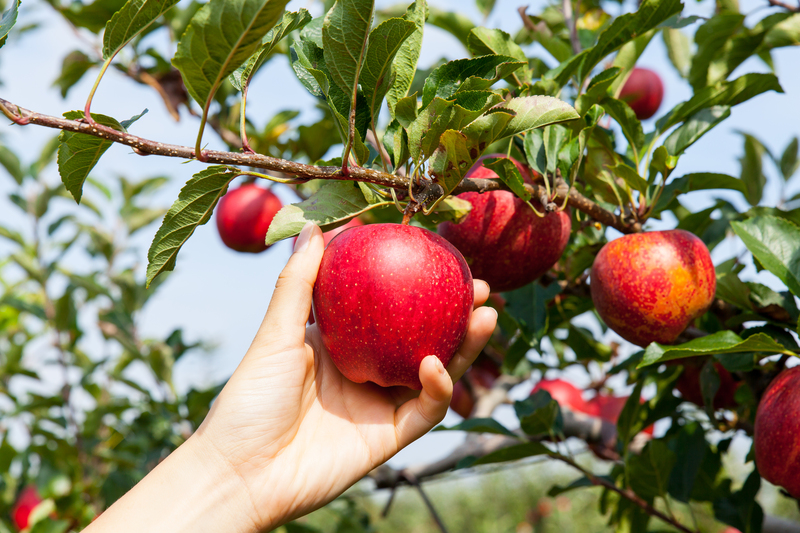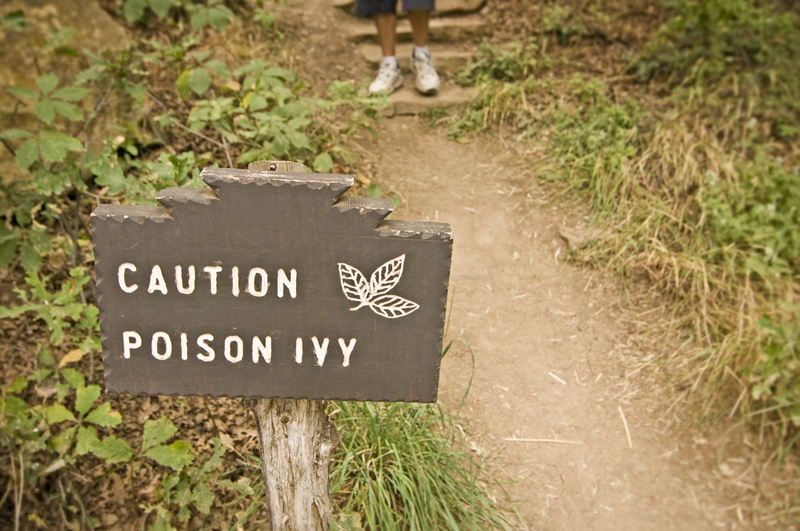Eco-friendly herb gardening: sustainable practices for beginners
Posted on 19/09/2025
Eco-Friendly Herb Gardening: Sustainable Practices for Beginners
Are you interested in growing your own herbs while making a positive impact on the environment? Eco-friendly herb gardening provides a way to cultivate flavorful additions to your kitchen with minimal harm to the planet. Whether you're a city dweller with a small balcony or have a sprawling backyard, starting a sustainable herb garden is easier than you think. In this comprehensive guide, you'll discover practical, green practices for herb gardening beginners looking to develop their green thumbs--and contribute to a healthier world.
Why Choose Eco-Friendly Herb Gardening?
Growing your own herbs is already a step toward sustainability, but embracing eco-friendly practices amplifies your positive environmental impact. Sustainable herb gardening reduces reliance on industrial farming, minimizes the use of harmful chemicals, and conserves resources. Here are some key reasons to choose an eco-friendly approach:
- Less Waste: Harvest only what you need, reducing food and packaging waste.
- Reduced Carbon Footprint: Homegrown herbs travel zero miles from garden to table.
- No Synthetic Chemicals: Protect pollinators and beneficial insects by avoiding pesticides and fertilizers.
- Biodiversity: Native and organic herbs can create a haven for bees, butterflies, and birds.
- Personal Wellness: Natural cultivation means tastier, safer produce for you and your family.

Getting Started: Planning Your Sustainable Herb Garden
Choose the Right Location
Most culinary herbs require at least 6 hours of sunlight each day. For an eco friendly herb garden, choose a spot that receives ample light and has good air circulation. Avoid areas prone to standing water to prevent root rot and diseases.
Start Small and Expand Gradually
It's tempting to plant dozens of different herbs, but starting with 3-5 varieties allows you to focus on sustainable care practices. Some easy-to-grow favorites for beginners include:
- Basil
- Mint
- Parsley
- Thyme
- Chives
Select Organic or Heirloom Seeds
For a truly sustainable herb gardening experience, purchase certified organic or heirloom seeds. These varieties have not been genetically modified and are typically grown without synthetic pesticides or fertilizers. Heirloom plants also promote genetic diversity among herbs, offering unique flavors and beautiful foliage.
Soil and Composting: Natural Foundations for Growth
Build Healthy, Living Soil
Soil quality is the foundation of any successful green herb garden. A sustainable approach emphasizes feeding the soil, not just the plants. Here's how:
- Compost: Create your own compost pile using kitchen scraps (vegetable peels, coffee grounds, eggshells) and yard waste. Compost enriches soil with nutrients and beneficial microbes.
- Worm Castings: Vermicomposting (composting with worms) produces nutrient-rich castings that strengthen plant immunity and boost growth naturally.
- Mulch: Add a layer of organic mulch, such as straw or shredded leaves, to retain moisture, regulate temperature, and suppress weeds without chemicals.
Say No to Chemical Fertilizers
While chemical fertilizers may seem like an easy shortcut, they disrupt delicate soil ecologies and can leach into waterways. For eco safe herb gardening, stick with compost and natural amendments like bone meal or seaweed extract when needed.
Eco-Friendly Watering Techniques
Water is a precious resource. With increasing droughts and water restrictions, it's vital to use it wisely in your herb garden. Here's how to conserve water while keeping your herbs thriving:
- Mulching: As mentioned earlier, mulch locks in soil moisture and reduces evaporation.
- Drip Irrigation: Install a simple drip or soaker hose system to deliver water directly to plant roots, reducing waste.
- Collect Rainwater: Set up a rain barrel to collect and store rainwater for garden use. This is an easy and eco-friendly way to water your herbs for free.
- Water Early in the Morning: Early watering minimizes water loss due to evaporation and reduces the risk of fungal diseases.
- Use Graywater: Reusing lightly used household water (from rinsing fruit, for example) can be a good option, but always avoid water that contains soap or chemicals.
Natural Pest and Disease Control
Maintaining a sustainable herb garden means fostering harmony, not fighting against nature. Here are some eco-friendly methods to manage pests and diseases without resorting to pesticides:
- Plant Diversity: Grow a mix of herbs and companion plants to attract beneficial insects, confuse pests, and improve your garden's resilience.
- Hand-Picking: Regularly check plants for pests, such as aphids or caterpillars, and remove them by hand.
- Neem Oil & Soap Sprays: Use mild, homemade sprays made from neem oil or diluted castile soap to deter pests naturally.
- Encourage Pollinators: Flowering herbs like basil and chives support bees and butterflies, which in turn help keep pest populations under control.
- Healthy Soil: Robust, well-fed plants grown in healthy soil are less prone to disease and attack.
Natural Remedies for Common Issues
Fungal diseases, such as powdery mildew, thrive in crowded, damp conditions. Space your herbs properly, provide airflow, and remove infected leaves promptly. Garlic or baking soda sprays can provide additional protection without disrupting the ecosystem.
Eco-Friendly Containers and Raised Beds
City living or limited green space shouldn't limit your eco friendly herb gardening ambitions. Containers and raised beds are excellent sustainable options:
- Recycled Materials: Upcycle wood, metal buckets, or old ceramics as planters. Avoid using treated wood or plastics that could leach chemicals into the soil.
- Terracotta Pots: Natural clay pots are porous, reusable, and biodegrade over time.
- DIY Seed Starting: Use newspaper pots, egg cartons, or toilet paper rolls to start seeds at home, minimizing the need for plastic.
- Easily Manage Soil Quality: Containers allow optimal soil composition, drainage, and mobility--especially handy for beginners.
The Importance of Organic Mulching
Mulching isn't just about water conservation. In eco herb gardening, a natural mulch layer offers multiple benefits:
- Suppresses Weeds: Reduces the need for chemical weedkillers.
- Improves Soil Health: As mulch decomposes, it releases nutrients back into the soil ecosystem.
- Moderates Soil Temperature: Keeping roots cool in summer and insulated in winter helps herbs thrive longer.
- Supports Wildlife: Mulch encourages earthworms and beneficial soil organisms, boosting biodiversity.
Seed Saving and Sharing: Closing the Sustainability Loop
Collecting seeds from mature herbs ensures you'll have plenty for the next growing season--without buying new ones. It also helps conserve unique, local varieties. Here's how to get started with herb seed saving:
- Choose Healthy Plants: Only select seeds from robust, disease-free plants.
- Allow Seeds to Mature: For many herbs (like coriander and dill), let the flowers fade and seeds dry on the plant before collecting.
- Store Wisely: Place seeds in labeled envelopes or glass jars. Store them in a cool, dry place until next season.
- Share with Community: Swapping seeds with friends or at local exchanges boosts local plant diversity and supports community resilience.
Composting Kitchen and Garden Waste
Composting is at the heart of all eco-friendly gardening practices. Creating a simple compost bin, pile, or tumbler allows you to:
- Recycle Organic Waste: Transform kitchen scraps and herb trimmings into rich, fertile compost.
- Feed the Soil Naturally: Compost improves soil structure, fertility, and water retention for a thriving herb garden.
- Reduce Your Footprint: Diverting waste from landfills slashes methane emissions and gives back to the earth.
Simple Companion Planting Tips for Herb Gardens
Companion planting involves growing certain herbs and plants together to boost their mutual health and productivity. Some classic companions for sustainable herb gardens include:
- Basil & Tomatoes: Basil helps repel tomato hornworms and can enhance tomato flavor.
- Parsley & Chives: Boost each other's growth and attract pollinators.
- Rosemary & Sage: Both like dry conditions and help ward off pests from other crops.
- Mint & Cabbage Family: Mint deters caterpillars and aphids from brassicas (cabbage, broccoli, etc.).
Harvesting Herbs Sustainably
Proper harvesting techniques ensure your green herb garden will continue to provide flavorful leaves for seasons to come:
- Harvest in the Morning: Essential oils (and flavors) are highest in the morning.
- Only Take What You Need: Regular, light harvesting stimulates growth--never remove more than one-third of a plant at a time.
- Use Clean Tools: Clean scissors or pruners prevent spreading diseases.
- Leave Roots Undisturbed: For cut-and-come-again herbs like chives or parsley, cut above the soil so the roots can regrow.
Common Mistakes to Avoid in Eco-Friendly Herb Gardening
- Using Non-Recyclable Plastics: Opt for biodegradable or recyclable materials for pots and labels.
- Neglecting Soil Health: Regularly enrich with compost or organic amendments to keep your herbs thriving naturally.
- Overwatering: Most herbs prefer drier soil--too much water leads to rot and disease.
- Ignoring Native Herb Species: Native plants are more resilient and require less maintenance and resources.
Final Tips for Sustainable Success
Embracing eco-friendly herb gardening doesn't require a green thumb or a huge budget. The key is to:
- Stay Observant: Eco gardening is about working with nature. Observe your plants' needs and adapt as the seasons change.
- Keep it Organic: Avoid chemicals and choose organic solutions everywhere possible.
- Share and Educate: Inspire others by sharing seeds, herbs, and sustainable knowledge with your community.
- Celebrate Your Harvest: Nothing tastes better than homegrown herbs nurtured in harmony with the planet.

Frequently Asked Questions About Sustainable Herb Gardening
1. What are the best herbs for beginners to grow sustainably?
Beginner-friendly options include basil, mint, chives, parsley, oregano, and thyme. These herbs are hardy, forgiving, and adapt well to various growing conditions.
2. Can I grow herbs sustainably indoors?
Absolutely! Use south-facing windows or LED grow lights, organic potting mix, and water mindfully. Indoor herb gardens especially benefit from eco-friendly, recycled containers and compost.
3. How do I avoid pests without chemicals?
Practice companion planting, vigor renewal through healthy soil, and use natural sprays (like neem oil or diluted soap). Regular monitoring and hand-picking also prevent major infestations.
Conclusion: Start Your Eco-Friendly Herb Garden Today
Whether you're in a bustling city apartment or a rural backyard, sustainable herb gardening is accessible, rewarding, and deeply beneficial for you and the environment. By choosing eco-friendly practices--like composting, organic mulching, water conservation, and planting diversity--you ensure that your culinary adventures support a greener, more vibrant world.
Start small, experiment joyfully, and enjoy the journey. Your homegrown herbs will not only flavor your meals but also nourish your connection to nature. Embrace eco-friendly herb gardening--for the planet and for yourself.
Latest Posts
Strategies for Pawsitive Garden Experiences
Step into the World of Orchids with Confidence
Eco-friendly herb gardening: sustainable practices for beginners

